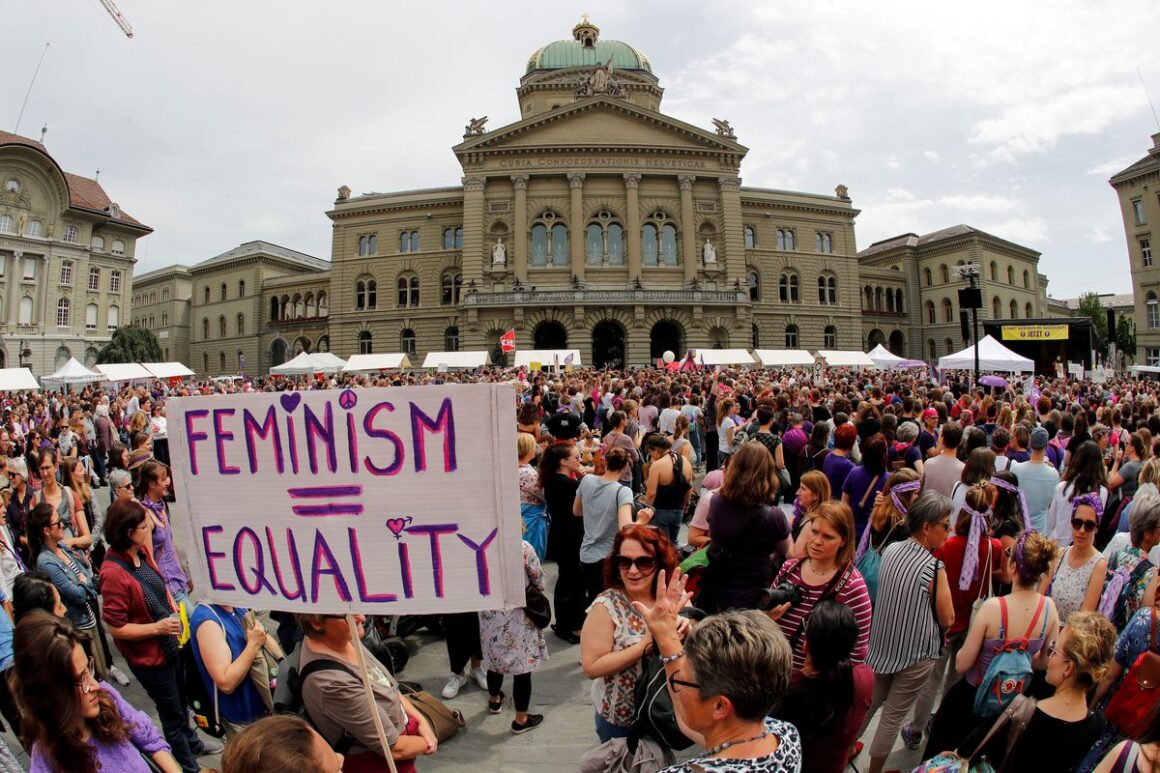First published on rosainternational.org
Four years after the historic 500,000 strong feminist strike on the 14th of June 2019, women, workers, LGBTQ+ and young people prepare to take to the streets again on the same date this year, and participate in strike action and protests in every city and town in Switzerland.
Biggest Mobilisation in a Decade
The 2019 strike represented the largest mobilisation since the general strike of 1918. The pressure it exerted has forced some important reforms and change, such as the introduction of paid paternity leave of 2 weeks in January 2021 and Marriage Equality in July 2022 for same sex couples. Needless to say however, that this is far from enough for the vast majority of working class women, LGBTQ+ and young people, and is still a far cry from the demands put forward during the 2019 strike.
There are still many reasons for people to mobilise into strike action this year, for example, a reform raising the retirement age for women from 64 to 65 has just been adopted in Switzerland last year. Given the ongoing struggle in France against the pension reform, this could be quite present in people’s minds. In addition, issues such as the lack of a minimum wage in many cantons, mainly affecting women in precarious and undervalued employment such as the care or retail sectors, is a huge concern. This is especially true in the context of the cost of living crisis, with food, energy, and accommodation costs rising as well as the system of unaffordable
compulsory private medical insurance which is putting a whole cohort of working class people and women in particular at risk of or into poverty.
Fighting back Against Attacks on Rights
Abortion rights are also under attack as there have been recent attempts to curtail abortion access by conservatives. In particular the right populist Swiss People’s Party (UDC/SVP), have launched a campaign of signature collection in an attempt to trigger a public vote on legislation that would introduce a mandatory one day waiting period before accessing abortion services, and to completely ban abortions from the 22nd week of pregnancy. These campaigns are still ongoing and should conclude at the end of June. However, if they manage to gather the required number of signatures, the population could be asked to vote on it in the coming months.
Childcare is also a massive problem in Switzerland, with close to no public provision and a lack of adequate spaces. While there is some provision for fees to be linked to parents’ income, it is still unaffordable for many. This is linked to the question of parental leave. While paternity leave of 2 weeks was recently introduced, the existing provision for parental leave is abysmal, with only 4 months for women.
Opposition to Gender based violence is also likely to be key for those mobilising in strike action, as well as the question of workplace sexual harassment. There is an ongoing struggle to redefine rape in criminal law to introduce the idea of active consent.
Trade Union and Feminist Collectives Activists Vote for Action
A unanimous vote in favour of calling for strike action on the 14th of June was passed at a national meeting of over 250 Trade Union and Feminist Collectives activists on the 4th of March.
The organisers are calling for the strike to take place in workplaces, but also in schools, universities and other education institutions, as well as in the home. A strong emphasis is being put on standing in solidarity with other struggles across the globe, such as the inspiring uprising in Iran over the past few months, and all of the oppressed people and victims of war, authoritarian regimes and environmental destruction. The organisers are also calling for the women’s movement to continue to promote inclusivity of all oppressed groups and use an approach of class struggle.
The demands of the strike include amongst others:
● The application of equal pay with a targeted raise in pay for low paid sectors
● The introduction of a minimum wage nationwide of 4500-5000 CHF/ month
● An increase in pensions that would allow people to live in dignity with no further increase
in the retirement age
● Better planning of work schedules to adapt to the needs of families
● A reduction in the working week to 30-35 hours max with no loss of pay
● Public childcare provision
● A zero tolerance in cases of sexist and sexual violence
● To force employers to put in place prevention measures against sexual harassment and
sexism in workplaces
● For the adopting into Swiss law of the convention 190 of the International Labour
Organisation against sexist and sexual violence in the workplace.
● Better services to deal with gender based violence
● The introduction of parental leave of 1 full year for each parent on full pay
● The scrapping of the private health insurance system and for better public provision of
sexual and reproductive health
● A national plan and public resources to fight against discrimination of people of colour,
LGBTQ people, people with disabilities; etc.
● Better protection of migrant women and asylum seekers
● A national plan of action for climate and the environment
● To include intersectional feminist ideas in the curriculum in schools
● The right to choose and free public provision of abortion to be included in the constitution
Strike action on the 14th of June can provide an important first step in building a struggle against gender-based oppression and exploitation, however, it is crucial that further democratic discussions of activists, trade union members and young people take place to build a sustained movement capable of forcing the government to act on the demands of the strike. The ongoing struggle in France can provide important lessons in what is needed to do just this. As we have seen there, the establishment is not willing to make compromises! It is therefore necessary to build links between the different struggles with the clear aim to build a socialist alternative to the capitalist system inherently based on exploitation, oppression and environmental destruction.












